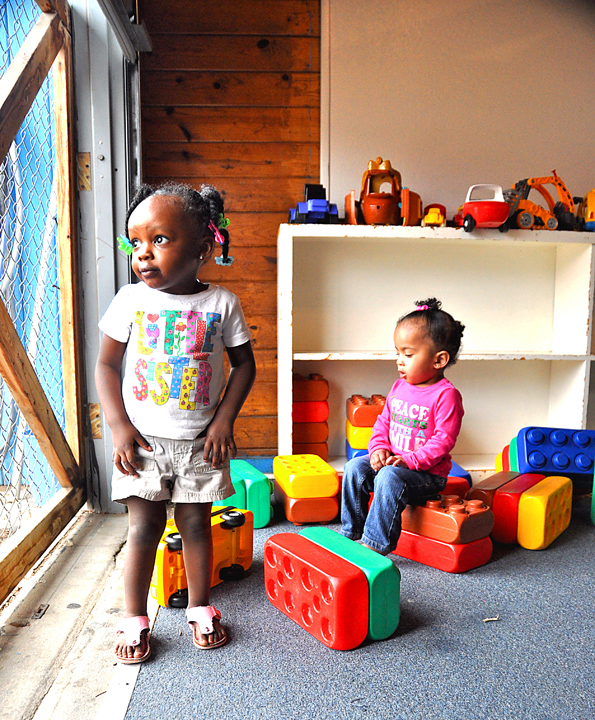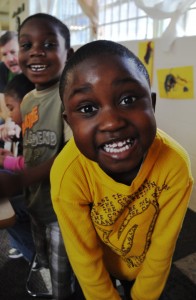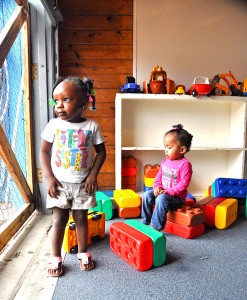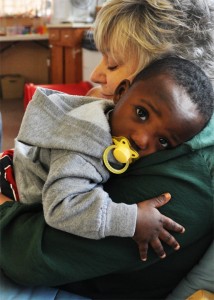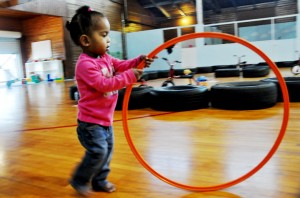[slideshow]
Story by Dorian Davis
Photos by Ashley Dunn
Behind every great team stands a great coach.
Nan Holmes lives to serve that purpose as the director of the Talitha Koum Institute where groundbreaking research is believed to soon change the way a child’s brain development pattern was once thought to process.
While there are no fences isolating the small Waco, TX neighborhood from nearby downtown, one would be inclined to believe they’d mistakenly crossed the border into a third-world country. The people of 8th street surrender their dependency each day to a convenience store and a fried chicken restaurant. To introduce a laundromat would be a luxury.
It’s from these confines that 23 individuals have been drawn upon to be the focus of the study, ranging from ages one to six. Each day, they enter a setting similar to a nursery where they may carefully be observed as they learn basic cognitive skills taught from the institute’s curriculum.
The heart of the study takes place in a vintage gymnasium that dates back to World War I. The aroma of the antique wood floors carries itself into Holmes’ adjacent office where she facilitates activities and general business.
“I believe it’s just an air-freshener,” she confesses.
Owned by the Waco Ecumenical Church, the institute’s main building received renovations in 2003. Holmes joined the now 14-year-old project in 2007 and hasn’t looked back. Having worked various careers, Holmes has found her time at the Talitha Koum Institute an experience that could only be explained by her warm smile.
“We all have work together to make the quality of life high for everybody,” Holmes said.
Holmes believes that philosophy is best applied in our society by helping others. More specifically, babies.
And as great coaches have shown, sometimes the simplest play call is all that’s needed to win.
“Good health can be good academic,” she preaches.
Of the 23 participants in the study, each is given two meals a day. For some, coming home to an empty dinner table is a nightly ritual.
“To think that you could really impact a child’s health so early,” Holmes said. “People do not really think about what it means to have good mental health when entering first grade or kindergarten.”
But as every great coach knows, not every game ends with a win.
“I’ve seen a brand new baby shutdown and it slept all the time. I didn’t know a baby could be shut down.”
The study is being lead by two Baylor University professors. Dr. Benedict, a child clinical psychologist at Baylor University, has headed the study since it’s beginning.
“To see Dr. Benedict come in and work with her,” she said. “That baby gives you kisses now. She’s in the fourth grade and she’ll be able to do anything she wants to do.”
The idea was formed when the founders of Talitha Koum visited a local school one day and questioned the counselor as to why the children were performing so poorly.
“And it was because of poor mental health,” Holmes said.
With their original intent to target and rehabilitate a group of teenagers, their focus suddenly changed.
“To think that you could really impact a child’s health so early in life, people don’t really think about what that means to have good mental health when entering first grade or kindergarten. Good health can be good academic.”
While Holmes believes the study is one of a kind, she acknowledges similar research has taken place examining the effects of educating children in different environments with many having consistent results.
Dr. James J. Heckman, a professor of economics at the University of Chicago, has gained attention for his studies concerning early childhood education and the economic impact it has on society.
“He’s confirming what we already know,” Holmes said. “And that’s kindergarten is too late.”
What sets apart a good coach from a great one is the ability to keep their cool when a bad call is made.
The light on beige phone blinks orange, complete with a blaring ring that nearly unsets the headset from its cradle.
“Hello, may I speak to Miss Koum?”
Instinctively, most would chastise a telemarketer for not only calling, but also failing to be better informed of the place of business. But Nan Holmes isn’t like most.
“It’s the story from the book of Mark,” she says, referring to the Bible passage Mark 5:41, in which Jesus revives a young girl believed to be diseased by holding her hand and shouting “Talitha Koum!,” which the New American Standard Bible translates as “Little girl, I say to you, get up!”
Unknowingly, the person on the other end of the phone shifts from pitching a sale, to being educated on the institute’s biblical connection.
But sometimes, it’s necessary for a good coach to call a time out.
During her tenure, Holmes points out that with the praise Talitha Koum has been given, it’s also inherited its fair share of criticism.
“People have told us that we should not bother with these people,” Holmes said boldly. “And for me, that’s not acceptable.”
Heavily dependent on donations and a grant through the city of Waco, Holmes emphasizes how important volunteers and interns have been to the Talitha Koum Institute in contributing their time to maintain day-to-day functions.
“We’ve had many volunteers come from Baylor. We probably couldn’t do what we do without them.”
Many of her volunteers have initiated interest through lectures and luncheons she’s participated in at Baylor University and McLennan Community College.
Holmes is also quick to credit the Baylor University graduates that helped setup their user database system.
“Graduates from the [Baylor] School of Accounting selected the software for our user database,” she said. “These three students were so smart and really put their heart into it, so we’re benefiting from it now.”
With a background in sports and broadcasting, some would attest that Holmes is qualified to coach a sports team. But instead, she feels the need to serve a greater purpose.
“I decided to come to Talitha Koum because I felt called to come here. I just felt called to come here and I just felt intrigued. Waco seemed to have so much bias of people of color,” Holmes said.
History tells us that the best coaches breed new ones.
Clare Paul, director of energy services for Baylor University’s facilities, wasn’t surprised to see Holmes make the transition from a position in broadcasting, serving as KWBU-TV’s vice president of major giving and special projects, to the director of the Talitha Koum Institute. Initially hired by Holmes as an intern, Paul spent many years observing the dedication and effort Holmes applied to her work. In particular, she recalls Holmes’ involvement in the station’s outreach initiative to help educate children and parents about common issues.
“I learned a lot from Nan. She knew a lot about public television and loved what she did. It really came through, so I was able to learn everything I need to know,” Paul said.
Paul is also reminded by “Ready to Learn,” a program which Holmes oversaw and coordinated.
“They would train caregivers of young children how to use programs like Sesame Street in the classroom and using media as a learning tool instead of as a babysitter,” Paul said.
“When Nan believes in a cause, there’s no stopping her,” said Brodie Brashaw, director for KWBU radio station.
Having worked alongside her for several years, Brashaw can attest to Holmes’ character.
“That’s who she is and that’s probably the truest thing I could say about her.”
Great coaches prepare their team for a game, but Nan Holmes has prepared her team for life.

